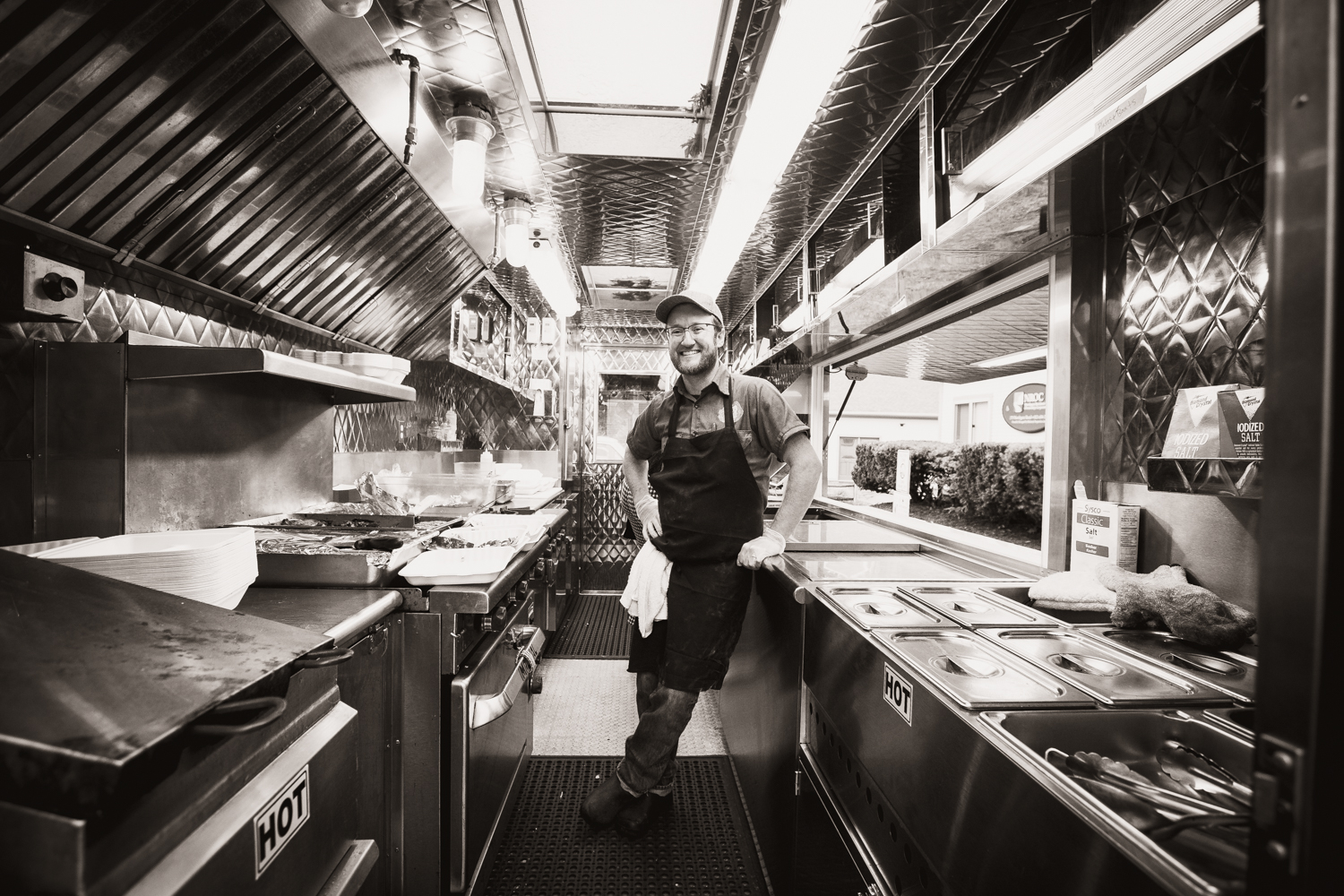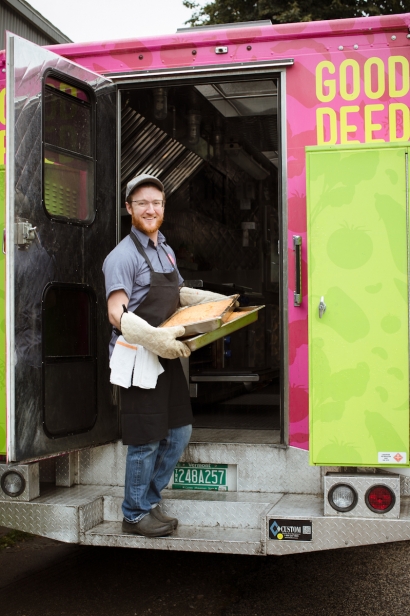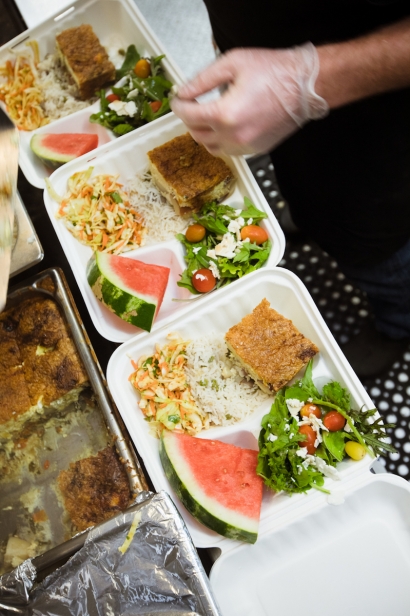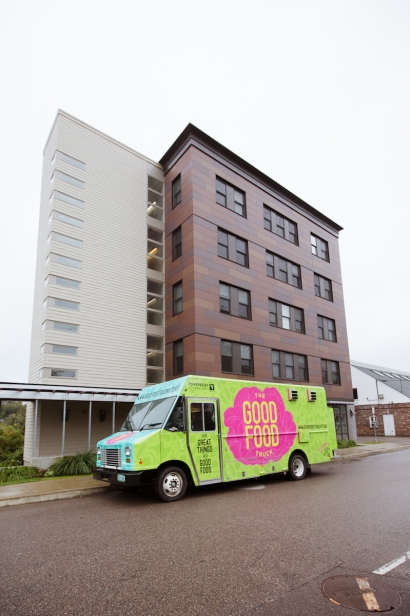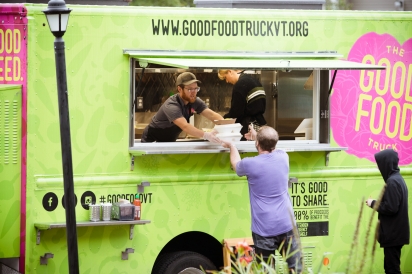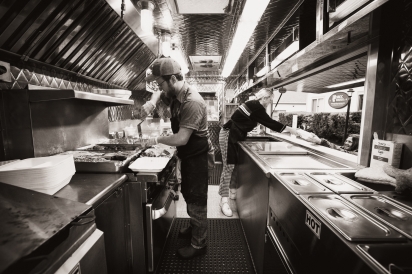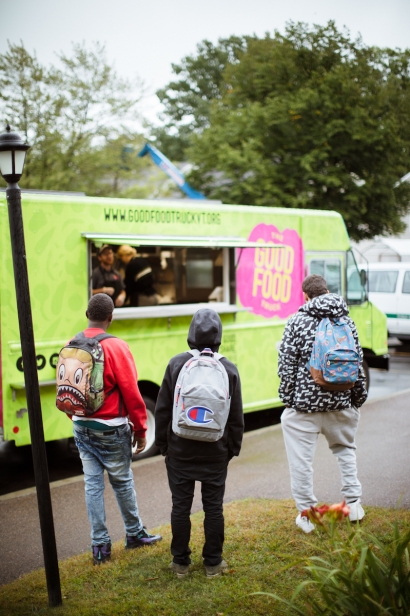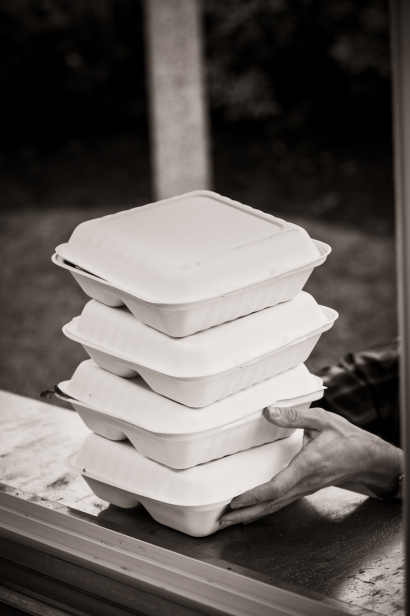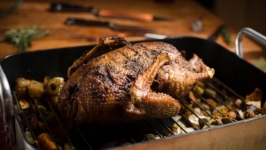The Good Food Truck Spreads the Love
The Good Food Truck is hard to miss. With its neon-green hue and hot-pink cabbage, it is clearly a food truck on a mission. The side of the driver’s door proclaims: “Doing great things with good food.” This distinct purpose sets the food truck apart from many, and although the notation isn’t anywhere on the truck (by design), it is a program of the Chittenden Emergency Food Shelf and delivers hundreds of free meals to low-income residents of the greater Burlington area, several days per week, from April through November.
The program began in the summer of 2015 and was the result of a meeting that food truck manager Emmet Moseley had with Food Shelf executive director Rob Meehan and development director Kelly Saunders. The Food Shelf had just received the grant for the truck, and Meehan and Saunders were searching for someone to build a mission-driven program around it.
As it turned out, Moseley was the perfect fit. His passion for food systems stems from a childhood growing up on a small farm in Derby, Vermont, followed by a stint working on a 14-acre CSA in Portland, Oregon. Upon his return to Vermont in 2011, Moseley worked at several restaurants before becoming involved with charitable food rescue through the Vermont Foodbank. This work ultimately led to his connection to the Chittenden Food Shelf.
“I felt like the food truck job combined everything I had been working on for the previous five years and was a chance to do something new and different in the field,” Moseley says.
The truck, purchased and outfitted with a grant from a private foundation, was designed by Katie-Marie Rutherford and Susan Weeks when they were part of HMC advertising. The duo also developed the truck’s website and has continued to donate their services via their own company, Ruthless & Wellington.
Initially, Moseley ran the food truck solo and relied 100% on volunteers to tackle the job of meal prep for the two sites he visited per week. Then, in 2017, he was able to bring on a part-time staff person. This year, he has a full-time staffer, Ashley Hermanowski, who has a nutrition degree from UVM and as a bonus, Moseley adds, can drive a 22-foot box truck. Hermanowski does most of the prep as well as meal service three nights per week. However, volunteers remain crucial and Moseley estimates four to five individuals put in 40 to 60 hours per week helping with prep and delivery of meals from the truck.
The six sites (and one rotating) Moseley and his team visit weekly include shelters and transitional housing facilities, spots where food access could be an issue as a result of transportation inconsistencies or even the stigma associated with being low income. Moseley said while there are 19,000 food-insecure individuals in Chittenden County (according to Feeding America), only 11,000 annually access the Food Shelf ’s programming. The food truck helps fill in those gaps by bringing meals to people’s residences. Weekly stops are made at the same time and places in order to establish a relationship with residents and give them a chance to realize that they are going to get a free, healthy meal without being expected to give something in exchange. There isn’t even a donation jar on the counter in order to alleviate any confusion.
Even though the vegetables for the meals largely come courtesy of the gleaning operations of the Intervale Center and the Vermont Foodbank, and about half the meat is local, Moseley notes that he is a low-income advocate and feels uncomfortable dictating that people should eat a certain way and adhere to strict locavore guidelines. Each meal consists of a protein, a starch, two vegetables and a fruit. Recently, a frittata with local spinach, red pepper and Shelburne Farms cheddar was served alongside a mixed green salad and roasted zucchini with lemon and basil from the Intervale Community Farm.
The tremendous impact the food truck has on the communities it visits can be measured both through survey data and casual conversations with customers. Of the roughly 70% of individuals who fill out surveys at the end of the season, 60% report having been inspired to try new foods, 35% purchase a new food after first trying it on the truck, and 65% of customers report that the food they eat on the truck is healthier than what they eat at home. This last point is key for longterm health, given that 40% of respondents report a medical condition that can be aff ected by diet such as diabetes or high blood pressure.
While the hard data is useful, Moseley stresses that the intangibles are also of importance. For example, the community building that results from joining together with neighbors for a meal and conversation. Ultimately, Moseley says, “The community meal program just helps people feel seen and cared for. Poor and vulnerable people often feel forgotten, and having this big shiny food truck pop into their world is a reminder that someone’s looking out for them.”
The Good Food Truck | @goodfoodtruckvt
Chittenden Emergency Food Shelf
Ruthless & Wellington | @ruthless_and_wellington
Feeding America | @feedingamerica
Intervale Center | @intervalecenter
Vermont Foodbank | @vermontfoodbank
Shelburne Farms | @shelburnefarms


